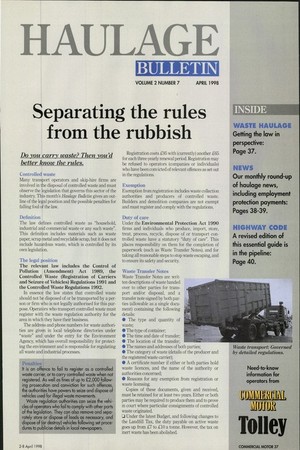Separating the rules from the rubbish Do you carry waste? Then you'd better know the rules.
Page 39

If you've noticed an error in this article please click here to report it so we can fix it.
Controlled waste Many trans ort operators and skip-hire firms are involved in the disposal of controlled waste and must observe the egislation that governs this sector of the industry This month's Haulage Bulletin gives an outline of the legal position and the possible penalties for falling foul of the law.
Definition The law defines controlled waste as "household, industrial and commercial waste or any such waste". This definition includes materials such as waste paper, scrap metal and recyclable scrap, but it does not include hazardous waste, which is controlled by its own legislation.
The legal position The relevant law includes the Control of Pollution (Amendment) Act 1989, the Controlled Waste (Registration of Carriers and Seizure of Vehicles) Regulations 1991 and the Controlled Waste Regulations 1992.
In essenc4 the law states that controlled waste should not be disposed of or be transported by a person or firm who is not legally authorised for this purpose. Operators who transport controlled waste must register with the waste regulation authority for the area in which they have their business.
The address and phone numbers for waste authorities are given in local telephone directories under "waste" and I under the entry for the Environment Agency, which has overall responsibility for protecting the environment and is responsible for regulating all waste and industrial processes. Registration costs £95 with (currently) another £65 for each three-yearly renewal period. Registration may be refused to operators (companies or individuals) who have been convicted of relevant offences as set out in the regulations.
Exemption Exemption from registration includes waste collection authorities and producers of controlled waste. Builders and demolition companies are not exempt and must register and comply with the regulations.
Duty of care Under the Environmental Protection Act 1990 firms and individuals who produce, import, store, treat, process, recycle, dispose of or transport controlled waste have a statutory "duty of care". This places responsibility on them for the completion of paperwork (such as Waste Transfer Notes), and for taking all reasonable steps to stop waste escaping, and to ensure its safety and security.
Waste Transfer Notes Waste Transfer Notes are written descriptions of waste handed over to other parties for transport and/or disposal, and a transfer note signed by both parties (allowable as a single document) containing the following details: • The type and quantity of waste; • The type of container; • The time and date of transfer; • The location of the transfer; • The names and addresses of both parties; • The category of waste (details of the producer and the registered waste carrier); • A certificate number if either or both parties hold waste licences, and the name of the authority or authorities concerned; • Reasons for any exemption from registration or waste licensing.
Copies of these documents, given and received, must be retained for at least two years. Either or both parties may be required to produce them and to prove in court where particular consignments of controlled waste originated.
Ci Under the latest Budget, and following changes to the Landfill Tax, the duty payable on active waste goes up from £7 to £10 a tonne. However, the tax on inert waste has been abolished. It is an offence to fail to register as a controlled waste carrier, or to carry controlled waste when not registered. As well as fines of up to £2,000 following prosecution and conviction for such offences, the authorities have powers to seize and dispose of vehicles used for illegal waste movements. Waste regulation authorities can seize the vehicles of operators who fail to comply with other parts of the legislation. They can also remove and separately store or dispose of loads as necessary, and dispose of (or destroy) vehicles following set procedures to publicise details in local newspapers.
























































































































